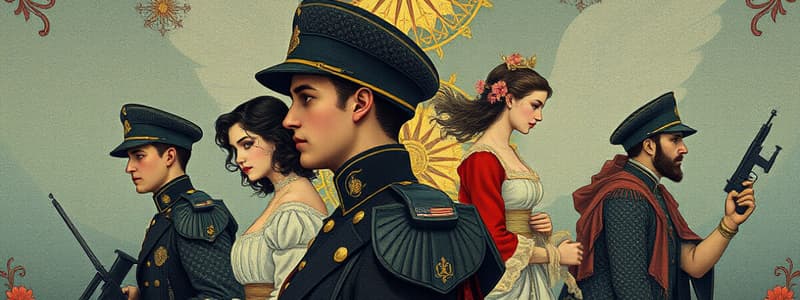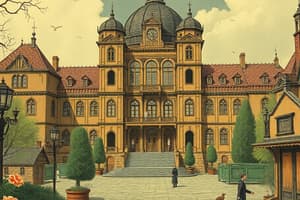Podcast
Questions and Answers
Which event is widely considered the catalyst for the outbreak of World War I?
Which event is widely considered the catalyst for the outbreak of World War I?
- The assassination of Archduke Franz Ferdinand (correct)
- The signing of the Treaty of Versailles
- The invasion of Poland
- The sinking of the Lusitania
The Berlin Wall was erected in 1961 to symbolize the divide between Eastern and Western Germany.
The Berlin Wall was erected in 1961 to symbolize the divide between Eastern and Western Germany.
True (A)
What was the primary ideology that drove the United States' foreign policy during the Cold War?
What was the primary ideology that drove the United States' foreign policy during the Cold War?
Containment
The _____ Revolution marked the beginning of industrialization in Great Britain.
The _____ Revolution marked the beginning of industrialization in Great Britain.
Match the following historical figures with their contributions:
Match the following historical figures with their contributions:
Flashcards are hidden until you start studying
Study Notes
Outbreak of World War I
- The assassination of Archduke Franz Ferdinand of Austria on June 28, 1914, is widely considered the catalyst for World War I.
- This event sparked a series of diplomatic crises, leading to the mobilization of allied and opposing nations.
The Berlin Wall
- Erected in 1961, the Berlin Wall symbolized the ideological and physical divide between Eastern (communist) and Western (democratic) Germany.
- The wall stood until 1989, marking the Cold War's tensions and the struggle for freedom in Eastern Europe.
U.S. Foreign Policy during the Cold War
- Containment was the primary ideology driving U.S. foreign policy during the Cold War, aimed at stopping the spread of communism.
- This ideology influenced U.S. involvement in various conflicts and support for anti-communist regimes worldwide.
The Industrial Revolution in Great Britain
- The Industrial Revolution began in the late 18th century in Great Britain, transitioning from agrarian societies to industrialized urban centers.
- Key innovations included the steam engine, mechanized textile production, and the development of iron-making techniques, transforming economies and societies.
Historical Figures and Their Contributions
- Matching historical figures with their contributions can provide insights into their impact on events and ideologies throughout history.
Studying That Suits You
Use AI to generate personalized quizzes and flashcards to suit your learning preferences.




